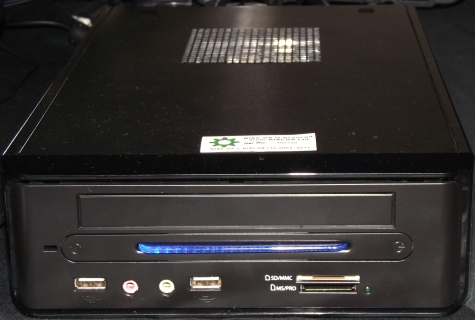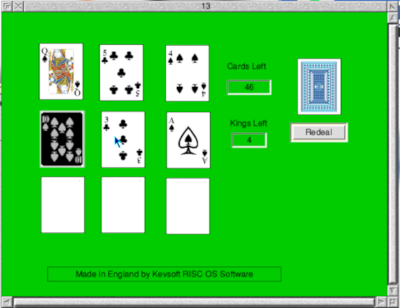Three! Count ’em! And new micro-SD cards, too!
Just prior to the Midlands Show, R-Comp announced that “Super Pack 6” was available for owners of the original ARMini computer, as well as BeagleBoard users who have subscribed to the BeagleBoard Support Scheme, shortly followed by the option to upgrade to 16/32GB micro-SD cards. Later in the same month, the second OS upgrade for members of R-Comp’s PiPlus scheme was made available, that being a similar arrangement as the BeagleBoard Support Scheme, but for Raspberry Pi owners. And, not leaving out the PandaBoard, earlier this month the company released an OS update for users of the ARMiniX computer, and members of the PandaLand scheme.
ARMini, BeagleBoard
Starting with Super Pack 6 for the ARMini, according to R-Comp’s Andrew Rawnsley the update is part of the company’s ongoing commitment to ARMini computer owners, providing “wide-ranging updates and improvements to all the disk-based software components of the ARMini computer system.”

The pack “includes many new and updated features including elegant support for internet time synchronising, updated USB pen drive support, desktop themes, improved configuration, and more” and “on top of this, many of the bundled applications have been updated to major new versions, so users will see significant benefits with the supplied software.” In total, the enhancements in the pack weigh in at roughly 70 megabytes, even after careful pruning to reduce the size of the download.
R-Comp considers the pack as particularly important, because it “smooths the way forwards for future operating system enhancements, and is essential for users wishing to have an elegant transition to future OS builds” – indeed, in an earlier announcement on the ARMini-support mailing list, Andrew said that “This is an essential update in preparation for the next OS update, which needs the updated disc components present in SP6 to function correctly, so please regard this update with some urgency.”
Although RISC OS 5.20 was unveiled at the Midlands Show, and formally released shortly afterwards, Super Pack 6 doesn’t include this new version of the operating system. Andrew explained in another post to the mailing list that there would very likely be two further updates to get the ARMini onto RISC OS 5.20:
“The first will likely be a 2013 edition of 5.19, before certain changes were made. This will allow users to move forwards more smoothly.Then, later in the year, we will make available 5.20 (or even 5.21) as updates in the normal fashion, and also (preferred) as a pre-load on a new, larger SD card.
This latter method is preferred as it allows us to bypass a potential issue in 5.20+ whereby USB devices may get different drive numbers. Booting entirely from the SD card wasn’t possible until recently, but it provides an elegant solution to a potentially clumsy problem. It will also give your ARMini a speed boost, as the SD port is generally a touch faster than USB. However, there will be a cost incurred with this, so it won’t be the only option. It may, however, be the best, and will bring ARMini more in line with what we’re now doing with ARMiniX and PiPlus.
We will have more information on this shortly – indeed, we may begin offering the SD cards sooner rather than later, as several people have already expressed interest.”
And, speaking of those SD cards, towards the end of July they became available, with R-Comp announcing that they were now able to take orders for 16GB and 32GB micro-SD card upgrades for original ARMini computers, and BeagleBoards (though he isn’t able to comment on compatibility with the original, non-xM BeagleBoards).
These micro-SD cards plug into the BeagleBoard-xM that sits in the ARMini, replacing the original card. “The large capacity and better performance” says Andrew, “allow these cards to become your ‘main drive’ on the computer, with your existing USB flash drive becoming a secondary, additional disc.”
A number of reasons are offered for this being R-Comp’s preferred method of upgrading the ARMini:
- micro-SD offers better performance than USB storage (not as dramatic as on ARMiniX, but still better).
- The micro-SD card contains both the OS partition and the main drive, as per ARMiniX and PiPlus. This standardises our approach across all machines, and fits with ROOL’s approach for Pi etc.
- 5.20 potentially affects the order in which USB devices appear. Booting from the micro-SD card means that boot-up is fixed (the micro-SD is needed to boot the board, so it is logically bound to be present when RISC OS starts). Since RISC OS boots by drive number, changes to the order of USB devices could result in boot-up difficulties. The micro-SD approach avoids this.
Andrew went on to clarify that the micro-SD card upgrade is entirely optional, explaining that R-Comp are still committed to providing their users with free OS updates for the original ARMini, regardless of whether the new micro-SD cards are used, but suggests that the cards are a very practical solution to moving people forwards.
Raspberry Pi
For Raspberry Pi owners signed up to the PiPlus scheme, an update became available in mid-July, and is one that “will smooth the transition from older versions of RISC OS on the Pi to a newer build, whilst also upgrading the Pi’s firmware and support files to the latest version.”
The new version is optimised for both performance and compatibility, and includes enhancements to USB, deals with problems with international setups and accented characters, and provides a slightly faster start-up. A “rollback” feature is also provided, which allows users to return to the previous setup, if necessary.
ARMiniX, PandaBoard
The most recent OS update released by the company was for ARMiniX computer users and members of the PandaLand scheme, and was announced near the start of September. Calling it a beta release, Andrew Rawnsley’s announcement says:
“I always said that we didn’t want to issue an update for ARMiniX until there were tangible benefits to be seen. The new OS version delivers that in the form of two significant updates. Firstly, Reset/Restart has been revamped, so that you can now easily restart via the main Shutdown window, akin to RISC OS Select/Adjust. In tests, this works much more reliably than it ever did before, so we hope users find this helpful.
Secondly, the new OS version supports SmartReflex CPU scaling. This allows your ARMiniX or PandaBoard to slow down when idle, to save energy and reduce running temperatures.”
There is, however, a caveat with this upgrade for PandaLand members, in that it is only suitable for people using 32/64GB SD cards in their PandaBoards:
“If you’re using a small SD card on your PandaBoard, and using a USB drive for !Boot etc, please contact us for details on how to upgrade and/or consider availing yourself of one of our 32/64Gb cards which are sold more-or-less at cost to PandaLand members.”
Andrew also added one final note in his announcement, explaining that the audio system on the PandaBoard is currently being worked on in order to take advantage of its expanded capabilities and warning that, as a result, users may find some audio is less than perfect on this release – which is why it has been classed as a beta release.
Availability
All three updates can be downloaded free of charge from the relevant websites, details of which, along with usernames and passwords, were supplied with the ARMini and ARMiniX computers, and with the information supplied with membership of the relevant support scheme. The micro-SD card upgrades for the ARMini are available to buy from R-Comp for £29.99 (16GB) or £49.99 (32GB) including VAT. Postage is £2.50 in the UK, more for overseas – contact R-Comp for details.




